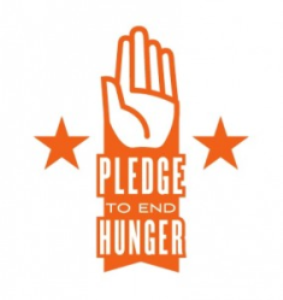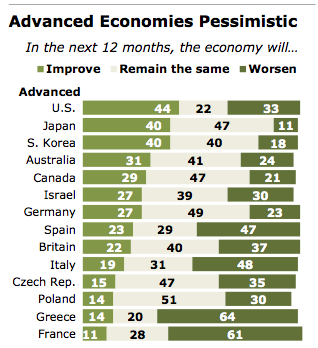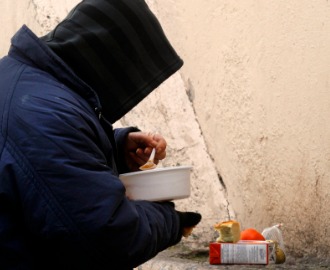Παρά τα όσα μάς λένε για ανάπτυξη, success stories, ότι "τα δύσκολα πέρασαν" και άλλα παρόμοια…, οι αριθμοί λένε άλλα…
"Σχεδόν το ένα τέταρτο των Ελλήνων και των Αμερικανών δεν έχει χρήματα για φαγητό" αναφέρει άρθρο του έγκυρου αμερικανικού περιοδικού Atlantic, με στοιχεία βασισμένα στην σχετική μελέτη του γνωστού αμερικανικού κέντρου έρευνας PEW. Σύμφωνα με την έρευνα, μπορεί η Ελλάδα να έχει τα χειρότερα στατιστικά στην Ευρώπη για την ανέχεια, ώστοσο το δείγματα της έρευνας του PEW δείχνουν ότι οι Έλληνες δεν είναι το ίδιο απαισιόδοξοι για το οικονομικό τους μέλλον. Όπως λέμε η ελπίδα πεθαίνει πάντα τελευταία.
Διαβάστε την έρευνα του Pew Research Center
Μέρος Α
Μέρος Β
Μέρος Γ
Μέρος Δ
Μέθοδος
Διαβάστε το κείμενο του Altantic
Nearly a Quarter of People in Greece and the U.S. Can't Afford Food
No matter where you're from, not having enough to eat is the ultimate signifier of economic distress. Food is the base of Maslow's hierarchy. It's the first concern in disaster zones. It's usually the last thing to go — after the car and the nice apartment — when you lose your job.
If you can't afford food, there's really nowhere to go but up. That's why it's so shocking just how many more hungry people there are now in what were formerly known as the world's well-off nations. According to a new Pew report released today, almost a quarter of people (24 percent) in the United States and Greece answered "yes" to the question, "Have there been times during the last year when you did not have enough money to buy food your family needed?"
The levels in other Western countries weren't quite that high, but the rate at which hunger has swept the eurozone since 2007 is still really dramatic:

Germany, which has been relatively sheltered from Europe's economic woes, bucks the trend: only 8 percent of Germans can't afford food, fewer than the 10 percent who said so in 2007.
Some Eastern European countries also seem to be doing better: Hunger plummeted in Poland from 35 percent in 2002 to 16 percent this year, and in Russia from 50 to 23 percent in the same timeframe. (We've written before about how currency depreciation had a big role in Poland's relative economic success .)
These numbers are particularly stark when you think about them in terms of countries that are historically not as wealthy. In Lebanon, only 1 percent of the population said they couldn't afford food (down from 12 percent in 2007), and in China, it was just 8 percent.
Of course, Europe obviously does not have it as bad as most of Africa and parts of the Middle East. In Uganda, Kenya and Senegal — some of the poorer countries surveyed — the majority of respondents said food is hard to come by.
Still, the data shows just how severely the Great Recession and the implosion of the eurozone has blighted some of the world's richest economies (and, ironically, some of its most-renowned food cultures.)
Coincidentally, these are the same developed countries where fewer and fewer people think the economy is "good" — a statistic that fell from 65 percent in Spain in 2007 to just 4 percent in 2013.
 Even though Greece has the worst hunger statistic in Europe, it's not the most pessimistic about its economic future. That dubious distinction goes to France, where just 11 percent of respondents said they thought the economy would improve. That could be a marker of national sentiment, a sign that Greece has simply hit bottom, or it could be related to the fact that unemployment in France recently reached a 15-year high. Either way, it's yet another terrible sign for Europe.
Even though Greece has the worst hunger statistic in Europe, it's not the most pessimistic about its economic future. That dubious distinction goes to France, where just 11 percent of respondents said they thought the economy would improve. That could be a marker of national sentiment, a sign that Greece has simply hit bottom, or it could be related to the fact that unemployment in France recently reached a 15-year high. Either way, it's yet another terrible sign for Europe.



















